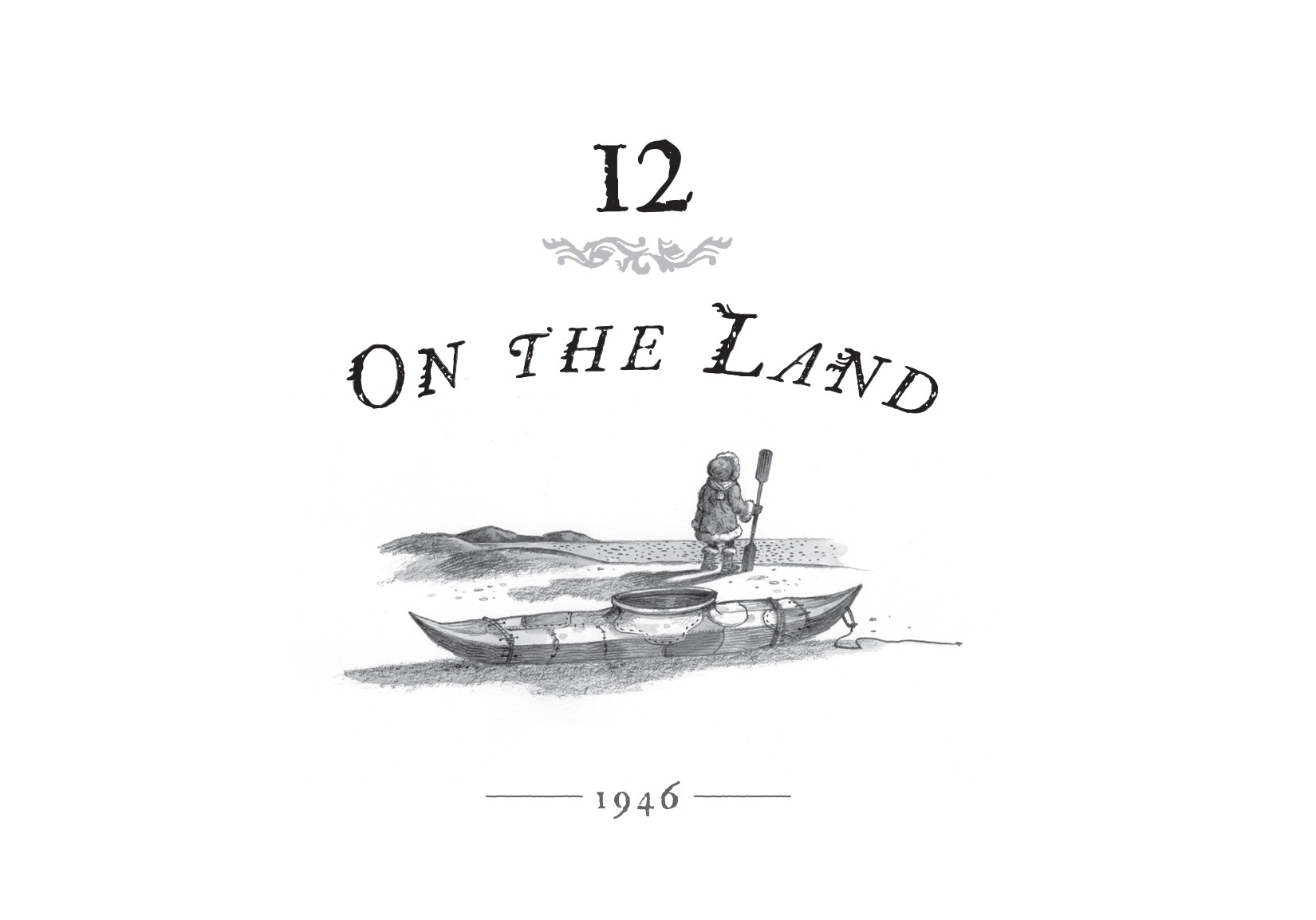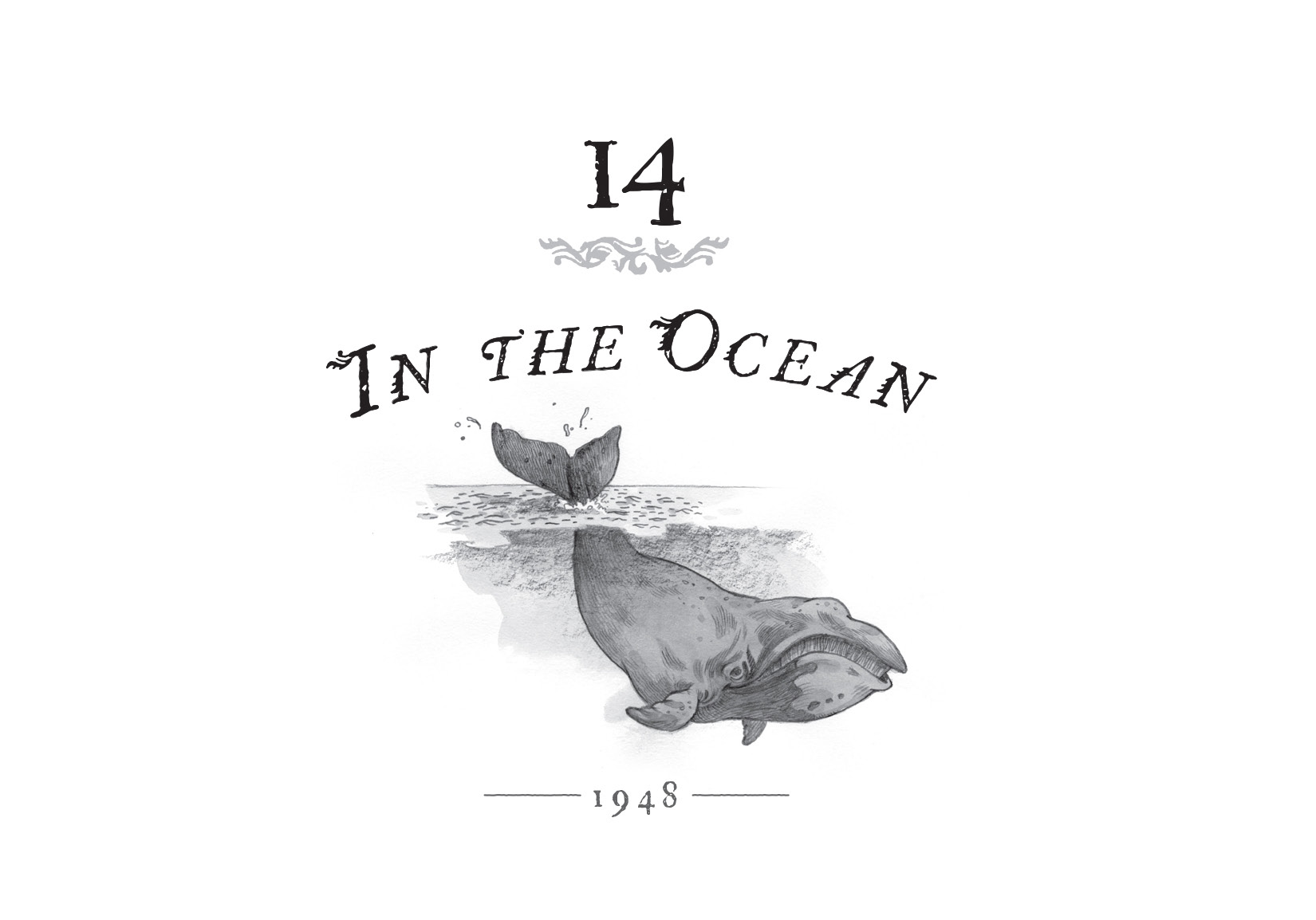Ice Whale (11 page)
Authors: Jean Craighead George


“Y
ou are a Christianâ” the minister said to Charlie
Toozak Vâ now a young man in his late twentiesâ as he sprinkled him with holy water and murmured a prayer.
“I will use your English name. I will call you Charlie.” The minister then shook his hand. Charlie Toozak was the first Eskimo of his family to have two namesâ English and Eskimo. “Welcome to the fold.”
With this deedâ Charlie thought the shaman's curse that he had heard about from his father and grandfather would vanish. But outside the church he still heard generations of voices repeating the words in his head: “Protect Siku until he dies.” But thenâ for the first timeâ he thought he heard an echo of those words: “Or until he saves a Toozak.”
That's odd
â he thought.
Imagine a whale saving a person. Those shamans are pretty clever.
He pushed back his hood and ran his fingers through his hair. Try as he might to brush it awayâ the curse was still upon him like snowfall. But now he had something new to think about. He could not shake it even though he no longer believed in shamans.
“Ohâ the power of Eskimo storiesâ” he lamented.
It was a new timeâ and yet the curse held him.

Several days laterâ U.S. Navy freight planes landed on the Barrow airstrip. Barges were being unloaded at the beach. Charlie Toozak went to see them. Sailors were unloading building suppliesâ vehiclesâ and machinery. An officer beside him said the materials had been transported here to build an Arctic research lab for the navy. When it was finished it would contain dining roomsâ business officesâ laboratoriesâ and living quarters for officers. Others would be for biologistsâ hydrographersâ weather scientistsâ oceanographersâ and anthropologists.
While Charlie was staring at the wondrous materials being loaded onto huge trucksâ the officer at his elbow told him that the United States had just ended a war. Now scientists wanted to know more about the peopleâ plantsâ animalsâ marine lifeâ and ocean currents in the Arctic.
“They are hiringâ” he said. “You should look into it.”
The next day Charlie Toozak applied for a job and was later hired to help with the wolf research program. A dozen captive wolves were being studied to learn how to survive the Arctic winters without water. He talked to his charges with howls and gestures and comforted them when they were ill. He loved his work and was good at it.
At the lab he spoke English and rarely used his Eskimo language. One day when his father asked him a questionâ he answered in English.
That day Toozak IV said to himselfâ
I cannot speak to my son. I cannot ask him where the airplanes come fromâ or how the trucks move without dogs. Have I lost him?

I
n the summer of l948â a freight ship sailed through the
Bering Strait and north on the Arctic Ocean. Belching black cloudsâ its propellers cutting the waterâ it steamed on to Barrow in only three days instead of weeks.
“Haul the crates out of the holdâ” ordered Captain Tom Boyd IV. “We are at Barrowâ Alaska.” His thirteen-year-old sonâ Thomas Boyd Vâ know as Tommyâ was watching the sun dip halfway below the horizon and rise again. The summer was nearly over. They must get out of the Arctic. Thenâ out of the ocean nearbyâ came a rare sightâ a bowhead whale. It blewâ breachedâ and dove.
Tommy stared.
“Dadâ” he saidâ “I just saw a whale. He had a funny white spot on his chin.”
“Say that againâ Tommy.”
“A whale. He had a spot that looks like a man dancing on his chin.”
“Really?” his dad questioned as he stared out into the ocean. Just thenâ the whale spy hopped out of the oceanâ greeting the ship. Captain Boyd sucked in his breath and stood motionless until the whale disappeared back into the oceanâ leaving waves in its wake. “There is a story our ancestors tell about seeing a whale just like that years ago. Could it be that same one with the mark on its chin? If soâ it's got to be a hundred years old! I didn't even think there were any bowheads left around here.”
Tommy's eyes widened. His father continued speaking. “Whaling used to be a very important industry around here. You know all of your forefathersâmy grandfatherâ and his father before himâ for as long back as we knowâworked on the sea. And some of them worked in the whaling industry. It employed thousands of skilled crews to harvest the whales. But the commercial whalers depleted the oceans and now there just aren't many whales left. So whaling isn't a business here anymore.”
“But Eskimos kill whalesâ” Tommy protested.
“Yesâ but for thousands of yearsâ they only killed what they needed. The whales are food and life's necessities.”
He patted his son on the back. “Maybe the whales are coming back.” He gazed out to the ocean once more and walked over to the railing to see that the cargo was unloaded with care.

N
ear the village of Barrowâ pulsating mechanical
booms shook 's ocean space. He surfaced and spy hopped. A group of men were setting off dynamite on the ice. They were looking for oilânot whale oil but petroleum. The roar of the engines bothered his ears and body. Taking a breathâ he dove deep into the coldâ clear water. Swimming as rapidly as he was able toâ he put distance between himself and the explosions. When he met the coastal currentâ he slowed down. The ocean currents split at Point Barrow. One flowed strong as a river to the north through heavy ice. The other flowed east along the Canadian coast.
's ocean space. He surfaced and spy hopped. A group of men were setting off dynamite on the ice. They were looking for oilânot whale oil but petroleum. The roar of the engines bothered his ears and body. Taking a breathâ he dove deep into the coldâ clear water. Swimming as rapidly as he was able toâ he put distance between himself and the explosions. When he met the coastal currentâ he slowed down. The ocean currents split at Point Barrow. One flowed strong as a river to the north through heavy ice. The other flowed east along the Canadian coast.
Every year since he had been bornâ Siku had taken the coastal currentâ but not this time. This time the blasts forced him to take a more difficult route farther north through broken ice to get to his summer home. Enjoying the tumbling floes as he swamâ he finally caught up with a group of male bowheads.
They had more members than they'd had in the last fifty years. No Yankees had been whaling since then. Now the ice whales were increasing in numbersâcoming out of hiding in bays and remote waters. was among them.
was among them.
 swam quietlyâ listening to the male bowheads and the whistles and roars of the females ahead of them. The females were communicating with each other and their newborns. Swimming among the ice chunks on the northern currentâ he heard no more whaling ships.
swam quietlyâ listening to the male bowheads and the whistles and roars of the females ahead of them. The females were communicating with each other and their newborns. Swimming among the ice chunks on the northern currentâ he heard no more whaling ships.
Then heard the distinctive sound of
heard the distinctive sound of
umiaq
paddles. He noted the location of the
umiaq
and turned away.
A harpooner in the
umiaq
saw turn and tossed the harpoon.
turn and tossed the harpoon.
Siku threw himself thirty feet in the air. When he splashed back down into the waterâ the waves swamped the
umiaq
. Siku would not give himself to this crew. He did not know them.
He was now one hundred years old and weighed sixty-five tonsâ and he could rock a whaling boat with a single swing of his huge flukes. He rose againâ and thrust himself out of the sea. Water rained down. The great splash reflected the sun's raysâ creating a glittering orangeâ greenâ and yellow waterfall. It was a beautiful moment. The huge wave that followed lifted the boat and drove it toward an ice floe.
Other boats came to helpâ thinking he was dead. But he was not dead. Pumping his gigantic flukeâ he dove.
 swam under the
swam under the
umiaqs
. The whalers watched the great whale in awe as he disappeared beneath the ice. They knew this whale was special.
A living mat of sea life growing on the seafloor glowed greenâ redâ and brown. He slowed down and lolled until he heard the whalers' paddles in the water. With thatâ he plunged down into the depths of Barrow Canyon.
In its dark valley he rested for almost forty-five minutes before rising to breathe. The whalers had left. Soaked by 's splashâ they had paddled to their ice camp to get out of their freezingâ wet parkas.
's splashâ they had paddled to their ice camp to get out of their freezingâ wet parkas.
 surfaced. Arctic cod circled him in a Ferris wheel of fish wizardry. They were seeking the same tiny food that he sought.
surfaced. Arctic cod circled him in a Ferris wheel of fish wizardry. They were seeking the same tiny food that he sought.
 felt emboldened by the many whirling cod. He spy hopped to see where he was. He saw only guillemotsâ in their black plumageâ their heads held high. He saw no whalers.
felt emboldened by the many whirling cod. He spy hopped to see where he was. He saw only guillemotsâ in their black plumageâ their heads held high. He saw no whalers.
 lay on the surface of the water breathing heavily. His rostrum protruded slightly. Slowly he became aware of a new sensation . . . a warm current. Barely a fluke wideâ it flowed over him like a scarf. It had come from the faraway Atlantic Ocean. Was it a sign of changes to come to the Arctic?
lay on the surface of the water breathing heavily. His rostrum protruded slightly. Slowly he became aware of a new sensation . . . a warm current. Barely a fluke wideâ it flowed over him like a scarf. It had come from the faraway Atlantic Ocean. Was it a sign of changes to come to the Arctic?
